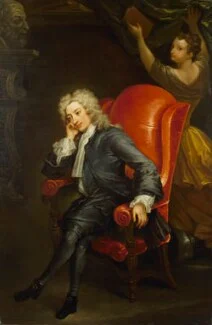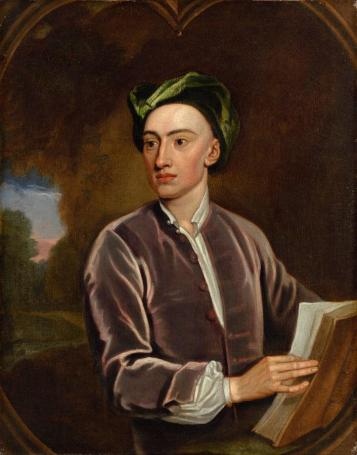
In 1711, poet Alexander Pope (1688-1744) published his first major work and
entered London literary circles, including Joseph Addison's. Starting in 1715, he achieved fame and income with his translations of Homer's Iliad and Odyssey. He inherited his association with the Sister Arts from his uncle, Samuel Cooper, a painter who earned a reputation as “Van-Dyke in little.” Pope himself ventured into sketching and painting by studying in the studio of the portraitist Charles Jervas around the years 1711-1713, living in Jervas’ London studio and using the Jervas’ address up until 1726.
This friendship is memorialized in Pope's poem, "Epistle
to Mr. Jervas, dated early 1719. A 1715 portrait of Pope by Jervas
depicts Pope’s preoccupied and distant state of mind when starting his
translation of Homer. In a (date) letter to his lifelong friend, Martha
Blount (1690-1763), who is believed to be the woman in the background of his
portrait, he wrote: “Fame is a thing I am much less covetous of, than your
Friendship; for that I hope will last all my life, the other I cannot
answer for.”
Later, Pope established other kinds of relationships with portrait
painters, appropriate to his growing fame and the political and cultural
controversies to which he responded as a satirical poet. While Pope sat for many portraits, he commissioned Godfrey Kneller (1646-1723), who had taught Jervas, for history paintings in 1719.
Kneller may not have had epistles written about him as Jervas had, but Pope still expressed his admiration for Kneller through his writing. Pope paid his compliments to Kneller for these paintings he had made by writing in 1719: “To Sir Godfrey Kneller, On his painting for me the Statues of Apollo, Venus, and Hercules' (1719):
What God, what Genius did the Pencil move
When KNELLER painted These?
Twas Friendship—warm as Phoebus, kind as Love,
And strong as Hercules.”
Portraiture has a strong hold through the 1730s, even after Kneller’s passing. At this time, Pope had moved on from translations and turned towards being a satirist. Portraits of Pope in this decade come from Jonathan Richardson Sr. (1667-1745), a painter who had literary aspirations. Richardson’s paintings were one of the distinguished collections Pope would have seen, larger than Jervas’s. Pope’s own collection was seen as not in the taste of a virtuoso—it lacked distinguished paintings done by old masters (da Vinci, Rembrandt, or even Rubens) and history paintings. His only histories were the ones he had commissioned Kneller to create for his staircase in 1719.
Pope’s years as a satirist produced works such as Moral Essays (four poems published in 1731-35), An Essay on Man (1733-34), and his masterpiece, the four books of The Dunciad (last being published in 1742). The content Pope wrote on was philosophical, ethical, and critical.
Upon his passing in 1744, it is claimed that friends surrounded him in his villa in Twickenham.

